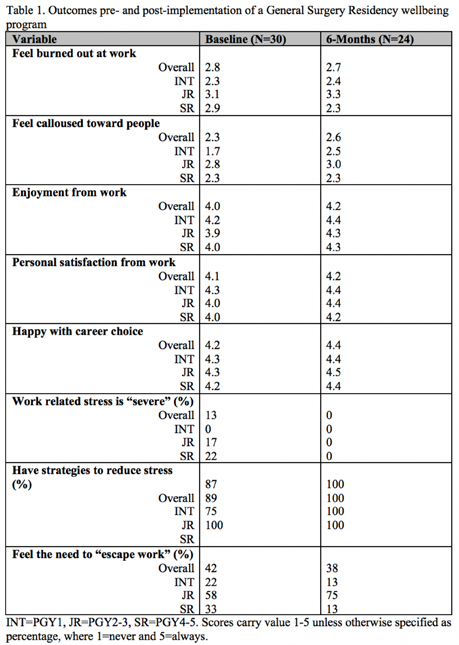Wellbeing Program Demonstrates Early Improvement in General Surgery Residency
Ryan J. Hendrix, *Jorind Beqari, *Michael Winton, *Jennifer Davids, *Ulises Torres, Anne Larkin, Jennifer LaFemina
University of Massachusetts Medical School, Worcester, MA
OBJECTIVE: Studies demonstrate >65% of surgical residents experience burnout during training. Our objective was to assess the impact of a wellbeing program on General Surgery Residents (GSR) and evaluate efficacy in reducing signs of burnout and improving personal wellbeing.
DESIGN: Cross-sectional, qualitative, self-reported survey.
SETTING: Tertiary care academic medical center.
PARTICIPANTS: 37 GSR stratified by PGY level: intern (INT=PGY 1), junior resident (JR=PGY 2 or 3), and senior resident (SR=PGY 4 or 5).
MAIN OUTCOME MEASURE: Assessment of burnout, depersonalization/callousness, and personal satisfaction at baseline and 6-months after implementation of a wellbeing program.
RESULTS: 30 (81%; 9 INT, 12 JR, 9 SR) and 24 (65%; 8 INT, 8 JR, 8 SR) GSR completed the baseline and 6-month surveys (Table 1). There was a decrease in residents experiencing burnout. All groups reported improvements in enjoyment, work satisfaction, and happiness with their career choice. Residents considering work-related stress as “severe” decreased. This was associated with global improvements in stress-reduction strategies. However, INT and JR may be at particular risk. While SR reported improved burnout, there was a slight increase for INT and JR. JR also reported higher rates of the need to escape from work. All groups reported a slight increase in feeling calloused toward people.
CONCLUSION: Implementation of a wellbeing program demonstrates improvement in resident enjoyment and satisfaction from work with a class-specific improvement in burnout. However, JR may be more at risk. Long term follow-up is needed to identify class-specific strategies that are most effective in reducing burnout in GSR. 




